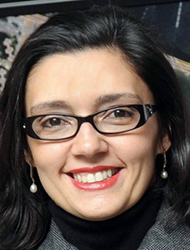Juliana Freire - Exploring Big Urban Data
- Keynote Speech

Juliana Freire is a Professor at the Department of Computer Science and Engineering at New York University. She holds an appointment at the Courant Institute for Mathematical Science, is a faculty member at the NYU Center for Urban Science and at the NYU Center of Data Science, where she is also the Director of Graduate Studies. Before, she was an Associate Professor at the School of Computing, University of Utah; an Assistant Professor at OGI/OHSU; and a member of technical staff at the Database Systems Research Department at Bell Laboratories (Lucent Technologies). An important theme is Professor Freire's work is the development of data management technology to address new problems introduced by emerging applications that manipulate different kinds of data, including urban, scientific and Web data. Her recent research has focused on big-data analysis and visualization, large-scale information integration, provenance management, and computational reproducibility. Professor Freire is an active member of the database and Web research communities, having co-authored over 140 technical papers, several open-source systems, and holding 10 U.S. patents. She is a recipient of an NSF CAREER, two IBM Faculty awards, and a Google Faculty Research award. She is also an ACM Fellow. She has chaired or co-chaired several workshops and conferences, and she has participated as a program committee member in over 70 events. Her research has been funded by grants from the National Science Foundation, DARPA, Department of Energy, National Institutes of Health, Sloan Foundation, Betty Moore Foundation, W. M. Keck Foundation, Google, Amazon, the University of Utah, New York University, Microsoft Research, Yahoo! and IBM.
Today, 50% of the world's population lives in cities and the number will grow to 70% by 2050. Cities are thus the loci of economic activity, and will continue to be the source of many of the innovations and novel approaches to the challenges of the 21st century. At the same time, cities are also the cause of looming sustainability problems and face huge challenges around, for example, transportation, resource consumption, housing affordability, and inadequate or aging infrastructure. The large volumes of urban data currently available, along with vastly increased computing power, open up new opportunities for us to better understand cities. In fact, there are already successful stories that have resulted in better operations, informed planning, improved policies and a better quality of life for citizens. However, analyzing urban data often requires a staggering amount of work, from identifying relevant data sets, cleaning and integrating them, to performing exploratory analyses over complex, spatio-temporal data.
An important long-term goal of our research is to enable interdisciplinary teams to crack the code of cities by freely exploring the vast amounts of data cities generate. In this talk, we will discuss some of the challenges involved which have led us to pursue new research on data management, data analysis and visualization techniques. We will present methods and systems we have developed to increase the level of interactivity, scalability, and usability for spatio-temporal analyses.This work was supported in part by the National Science Foundation, a Google Faculty Research award, the Moore-Sloan Data Science Environment at NYU, IBM Faculty Awards, NYU School of Engineering and Center for Urban Science and Progress.




